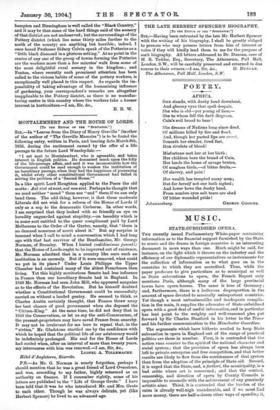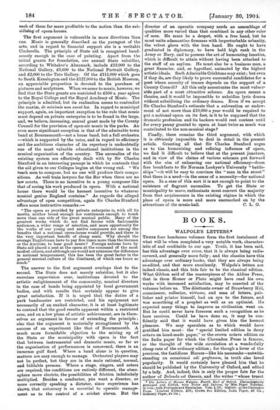MUSI C.
STATE-SUBSIDISED OPERA.
THE recently issued Parliamentary White-paper containing information as to the financial support furnished by the State to music and the drama in foreign countries is an interesting document in more ways than one. Much might be said, for instance, on the light which it throws on the industry and the efficiency of our diplomatic representatives as instruments for the collection of information as to what goes on in the countries to which they are accredited. Thus, while the paper professes to give particulars as to municipal as well as State subventions to opera, the French Report only mentions Paris, although many of the large provincial towns have opera-houses. The same is true of Germany ; and, furthermore, there is a ludicrous disproportion in the amount of space devoted to musically unimportant countries. Yet though a most unbusinesslike and inadequate compila- tion in the main, it supplies the advocates of State-subsidised opera with a good deal of useful information, and in particular has lent point to the weighty and well-reasoned plea put forward by Sir Charles Stanford in his letter to the Times and his further communication to the Manchester Guardian.
The arguments which have hitherto availed to keep State subvention in opera in England out of the range of practical politics are three in number. First, it is contended that the notion runs counter to the spirit of the national character and social system ; that the provision of opera has always been left to private enterprise and free competition, and that better results are likely to flow from the continuance of that system than from the adoption of the principle of State aid. Second, it is urged that the State, and, a fortiori, the municipality, is a bad critic where art is concerned ; and that the control, censorship, and direction of opera by County Councils is impossible to reconcile with the achievement of any genuinely artistic aims. Third, it is contended that the burden of the rates is already well-nigh unendurable, and if we must find more money, there are half-a-dozen other ways of spending it,
each of them far more profitable to the nation than the sub- sidising of opera-houses.
The first argument is vulnerable in more directions than one. Music is generally described as the youngest of the arts, and in regard to financial support she is a veritable Cinderella. The principle of State aid is recognised hand- somely enough in the case of painting. Apart from the initial grants for foundation, our annual State subsidiea, according to Whitaker's Almanack, include £13,000 to the National Gallery, 25,600 to the National Portrait Gallery, and £2,000 to the Tate Gallery. Of the £115,000 which goes to South Kensington and the 2127,000 to the British Museum, an appreciable proportion is devoted to the purchase of pictures and sculptures. When we come to music, however, we find that the State grants are restricted to 2500 a year apiece to the Royal College and the Royal Academy of Music. The principle is admitted, but its realisation seems to contradict the maxim, de minimis non carat lea. In regard to municipal support, again, an important exception to the rule that music must depend on private enterprise is to be found in the large, and, we believe, increasing, annual grant made by the County Council for the provision of open-air music in the parks. An even more significant exception is that of the admirable town band at Bournemouth—not a brass band, but a full orchestra —which is supported by the lutes, and in regard to efficiency and the ambitious character of its repertory is undoubtedly one of the most valuable educational institutions in the musical organisation of the country. The anomalies of the existing system are effectively dealt with by Sir Charles Stanford in an interesting passage in which he contends that
the aid given to our Colleges begins at the wrong end. "We teach men to compose, but no one will produce their compo- sitions. As well train lawyers for the Bar when there are no law courts. There is no incentive to a young composer like that of seeing his work produced in opera. With a national house there would be the keenest incentive to whatever musical genius England contains." As regards the alleged advantage of open competition, again Sir Charles Stanford offers some instructive remarks :—
" The opera as provided by private enterprise is, with all its merits, neither broad enough nor continuous enough to touch more than one side of the great musical public. Many of the greatest works which do not find favour with fashionable audiences, a wider range of selection, and more opportunity for the works of our young and native composers are among the benefits that a national opera-house would provide, and there is the very important benefit of cheap seats. Why should the average Englishman have to pay five times more than the German or the Austrian to hear good music? Foreign nations have by State aid placed a seat at the opera at the command of the most modest citizen, and although one would not minimise the difference in national temperament, this has been the great factor in the general musical culture of the Continent, of which one hears so much."
The answer to the first argument overlaps that to the second. The State does not merely subsidise, but it also exercises supervision over, institutions devoted to the artistic enlightenment of the community, musical directors
in the case of bands being appointed by local government bodies, and with results that certainly appear to give great satisfaction. If it is urged that the duties of a park bandmaster are restricted, and his equipment not necessarily of an exalted character, it is at least legitimate to contend that the good results apparent within a restricted area, and on a low plane of artistic achievement, are in them- selves an argument in favour of extending the principle ; also that the argument is materially strengthened by the success of an experiment like that of Bournemouth. A much more formidable objection to the mixing up of the State or the municipality with opera is the fact
that between instrumental and dramatic music, so far as the organisation of performances is concerned, there is an immense gulf fixed. Where a band alone is in question,
matters are easy enough to manage. Orchestral players may not be perfect, but they are in the main rational, normal, and biddable persons. Where a stage, singers, and actors are required, the conditions are entirely different, the atmo-
sphere more electric, the possibilities of friction indefinitely multiplied. Besides a conductor, you want a director, or more correctly speaking a dictator, since experience has shown that autocracy is as essential to operatic manage- mentr as to the control of a cricket eleven. But the
director of an operatic company needs an assemblage of qualities more varied than that combined in any other ruler of men. He must be a despot, with a free hand, but he must unite adamantine firmness with imperturbable urbanity, the velvet glove with the iron hand. He ought to have graduated in diplomacy, to have held high rank in the Army or Navy, and to possess the art of humouring lunatics, which is difficult to attain without having been attached to the staff of an asylum. He must also be a business man, a great financier, and, es hypothesi, animated by the highest artistic ideals. Such Admirable Crichtons may exist; but even if they do, are they likely to prove suocessful candidates for a post where security of tenure depends on the support of a County Council ? All this only accentuates the most vulner- able part of a most attractive scheme. An opera means a theatre, and it would be impossible to subsidise lyric drama without subsidising the ordinary drama. Even if we accept Sir Charles Stanford's estimate that a subvention or endow-
ment of not more than 210,000 a year would be required to put national opera on its feet, is it to be supposed that the
dramatic profession and its backers would rest content until for every penny granted to opera at least twice as much was contrauted to the non-musical stage?
Finally, there remains the third argument, with which it is oVviously impossible to deal in detail in the present article. Granting all that Sir Charles Stanford urges as to the humanising and refining influence of opera, we find it difficult to believe that at the present juncture, and in view of the claims of various schemes put forward with the aim of enhancing our national efficiency—from free breakfasts to Sir Norman Lockyer's University " battle- ships "—it will be easy to convince the "man in the street" that there is a need—in the sense of a necessity—for national opera. In a ease of this sort it is not enough to point to the existence of flagrant anomalies. To get the State or municipality to more, enthusiasts must convert the majority from that acquiescence in the existing regime in which the place of opera is more and more encroached on by the attractions of the music-hall. C. L.























































 Previous page
Previous page